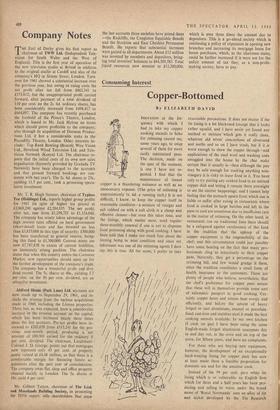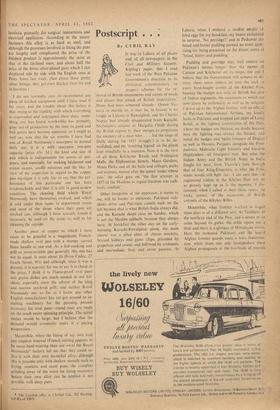Consuming Interest
Copper-Bottomed
By ELIZABETH DAVID IRRITATION at the fre- quency with which I had to take my copper cooking utensils to Soho for retinning caused me, some years ago, to sWap several of them for more easily maintained pans. The decision, made on the spur of the moment, is one I have not re- pented. I find that the maintenance of tinned copper is a thundering nuisance as well as an unnecessary expense. (The price of retinning is approxirnately Is. 6d. a running inch.) It is not difficult, I know, to keep the copper itself in reasonable condition—a mixture of vinegar and salt rubbed on with a soft cloth is a cheap and effective cleaner—but even this takes time, and the linings, which matter most, need regular three-monthly renewal if one is not to dispense food poisoning along with good cooking. I have been told that I make too much fuss about the tinning being in mint condition and since my informant was one of the retinning agents I dare say this is true. All the same, I prefer to take
reasonable precautions. It does not matter if the tin lining is a bit blackened (except that it looks rather squalid, and I have never yet found any method or mixture which gets it really clean, whatever old wives' concoctions of silversand and meths and so on 1 have tried), but if it is worn enough to show the copper through—and applications of the steel wool and washing soda smuggled into the house by the char make certain that it usually is—then although the pan may be safe enough for cooking anything non- vinegary it is risky to leave food in it. You have only to try putting any cooked food in an unlined copper dish and letting it remain there overnight to see the sinister happenings; and I cannot help feeling that the stomach upsets from which one is liable to suffer after eating in restaurants where, food is cooked in large batches and left in the pans to cool are sometimes due to insufficient care in the matter of retinning. On the other hand, in restaurants run on traditional lines there should be a safeguard against carelessness of this kind in the tradition that the upkeep of the copper equipment is the responsibility of the chef; and this circumstance could just possibly have some bearing on the fact that many pro- fessionals cling so tenaciously to their copper pans. Naturally, they get a percentage on the retinning bill, and few would grudge it them, since the tradition constitutes a small form of health insurance to the customers. There are plenty of people who believe, nevertheless, that the chef's preference for copper pans means that these will in themselves provide some sort of talismanic passport to good cooking. Cer- tainly copper heats and retains heat evenly and efficiently, and before the advent of heavy forged or cast aluminium, enamel or porcelain lined cast-iron and stainless steel it made the best cooking utensils available. In my own kitchen (I cook on gas) I have been using the same English-made forged aluminium saucepans day in and day out, in the oven and on top of the stove, for fifteen years, and have no complaints.
For those who are buying new equipment, however, the development of an exceptionally hard-wearing lining for copper pan's has now at least made them a feasible proposition for domestic use and for the amateur cook.
Instead of the 99 per cent. pure white tin lining which is so vulnerable,' an English firm which for three and a half years has been pro- ducing and selling its wares under the brand name of 'Royal Normandy' uses an alloy of tin and nickel developed by the Tin Research
Institute primarily for surgical instruments and electrical appliances. According to the manu- facturers this alloy is as hard as steel, and although the processes involved in lining the pans are lengthy and complicated the price of the finished product is approximately the same as that of the tin-lined ones; and about half the price of the Swiss silver-plated pans which I saw displayed side by side with the English ones at Peter Jones last week. (Sad about those pretty silver linings; they get even blacker than tin and in less time.) I do not normally care to recomMend any piece of kitchen equipment until I have used it for years. and the trouble about this policy is that owing to the rapidity with which everything is superseded and redesigned these days. some- thing one has found worthwhile has probably gone out of production by the time its good and had points have become apparent: so I might as well say now that for six months I have had one of Royal Normandy's saucepans in normal daily use; it is a milk saucepan, two-pint capacity (price 43s. 3d.). the kind and size of pan which is indispensable for scores of pur- poses, and especially for making bdchamel and cream sauces, souffld mixtures and the like. In view of my scepticism in regard to the copper pan mystique it is only fair to say that the per- formance of this particular one has been irreproachable and that it is still in good-as-new condition. The cleaning fluid which Royal Normandy have themselves evolved, and which is sold under their name in department stores and most of the shops where their pans are stocked can, although I have scarcely found it necessary, be used on the inside as well as for cleaning the outside. • Another piece of copper to which I have cause to be .grateful is a magnificent French- made sh‘allow oval pan with a stumpy curved brass handle at one end. As a fish-cooking and grill or stove-to-table pan generally this one has not its equal. It costs about £6 (from (adec, 27 Greek Street, WI) and although. since it was a present, it is scarcely for me to say it is cheap at the price, I think it is. Flame-proof oval pans and gratin dishes. are much needed in our kit- chens, especially since the advent of the long and narrow eye-level grill; and neither Royal Normandy nor so far as I know any other English manufacturer has yet got around to in- stalling machinery for the pressing Process necessary for oval pans—round ones are made on the much easter spinning principle. The initial outlay would be large; but I believe that the demand would eventually make it a pa log Proposition.
Meanwhile. when the lining of my own oval pan requires renewal (French tinning appears to be more hard-wearing than our own) the Royal Normandy* factory tell me that they could re- line it with their own tin-nickel alloy, although this is possible only with shallow utensils such as frying, omelette and saute pans; the complete grinding away of the worn tin lining necessary before their own alloy can be applied is not Possible with deep pans.
• The London office is Clarbat Ltd., 102 Barring- ton Road, SW9.



































 Previous page
Previous page